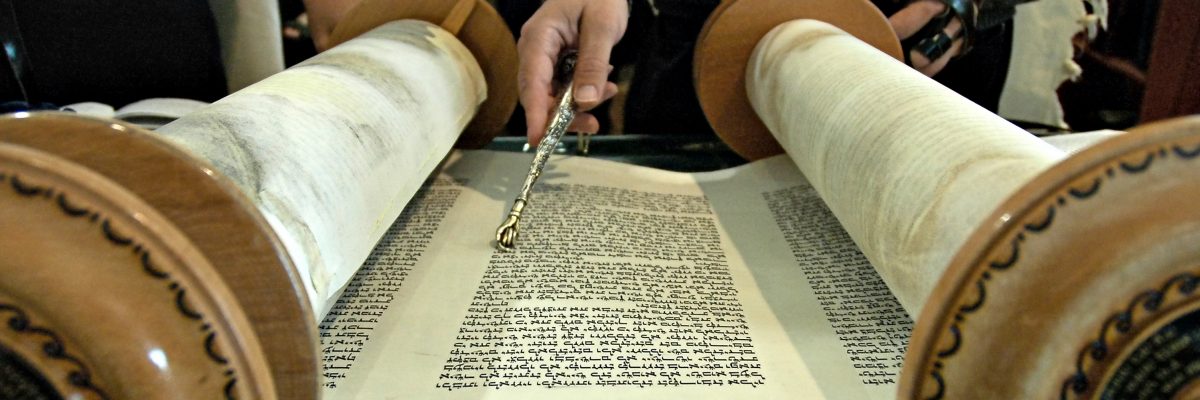
Homily for the Third Sunday in Ordinary Time, Year C
He came to Nazareth, where he had grown up,
and went according to his custom
into the synagogue on the sabbath day.
He stood up to read and was handed a scroll of the prophet Isaiah.
He unrolled the scroll and found the passage where it was written:
The Spirit of the Lord is upon me,
because he has anointed me
to bring glad tidings to the poor.
He has sent me to proclaim liberty to captives
and recovery of sight to the blind,
to let the oppressed go free,
and to proclaim a year acceptable to the Lord.
Rolling up the scroll, he handed it back to the attendant and sat down,
and the eyes of all in the synagogue looked intently at him.
He said to them,
“Today this Scripture passage is fulfilled in your hearing.”-Luke 4:16-21
The scene in today’s Gospel should not make us think of the way readings are proclaimed generally in Roman-rite parishes today. The scene would be much more solemn. The reader would have his head covered with his shawl and he would not be making lots of eye contact with the people while reading dramatically as though on stage.
No, his way of reading would remind us of a mosque (the Muslims got their way of reading from the Jews and from us Christians!) or of a Greek or Russian or Arabic liturgy. Our Lord would have sung the twenty or so lines of the prophet Isaiah appointed in a chant called technically a cantillation. If you would like to have some idea of how he would have sounded, just type in “Sephardic Haftarah” on YouTube or some other service. It might not be exactly what you would have heard in Our Lord’s day, but it would definitely be close.
The sung reading used to be a requirement in the Roman rite if the Mass itself was to be sung; this is still true in the Extraordinary Form, and it is an option in the Ordinary Form, although the Ordinary Form never strictly requires sung readings. But let us say that this custom was common and expected in Catholic liturgies until recent decades, and still is maintained in some places.
All this history is just to point out that there is more to listening to Scripture readings than instruction or entertainment. Liturgical readings are predominately organized, especially at Sunday Mass and at Masses of solemnities or votive or requiem Masses, to forth a shadow or type or prophecy—and then its fulfillment. So it is that on Sunday the first reading is always a lead-up to what is presented in the Gospel.
Of course, for us the Old Testament is fulfilled in the New, and so this liturgical order expresses the actual unfolding of the events of our salvation. In the synagogue liturgy there is a reverse order: first a reading from the Torah—the most authoritative reading, like our Gospel. Yet because the Torah is looking for fulfillment, a text of the prophets is read after in the same spirit of a commentary on the principal reading, and implicitly looking forward to the fulfillment of the gospel. And this is just what Our Lord does: he proclaims the prophecy and then announces the gospel, the Good News of its fulfillment and he is right there. His presence is, as it were, the gospel in flesh and blood!
We liturgical Christians of East and West are meant to believe that our liturgical readings have a power to make the realities of which they speak real here and now, “fulfilled in our hearing.” The strongest example of this takes liturgical reading way beyond its normal limits. Every Holy Mass has a first reading and a gospel reading, but there is one more “reading” that is the goal and fulfillment of our pronouncing of the scriptures.
It is this: at the double consecration of the Mass the priest recites the account of the Last Supper, and these very words bring about the change of bread and wine into the substantial and real presence of the Body and Blood of the Lord! Of course, by virtue of his ordination the priest acts in the person of Christ, because only Christ has the power to make real, to fulfill the promises of Scripture, and he does this lavishly and supremely in the consecration of the Holy Sacrament which he so longed to give us the night before he suffered.
Everything in our worship is touched by and ordered to and draws its power from the Blessed Eucharist, most of all matter of the sacraments: water, wine, oil, the readings and psalms, sacred images, and vesture. It is all there not just to instruct or entertain us, but because it all really does something real. This is not mere magic. It is more than magic; it is the power of Christ reaching into our hearts through sensible things so as to unite us to himself.
This is the genius and the particular quality of the Catholic experience of the religion revealed by Christ. Anything less is an impoverishment. So let us seek always to grow in our gratitude and appreciation for the right worship, literally the “orthodoxy” which is or should be ours.



